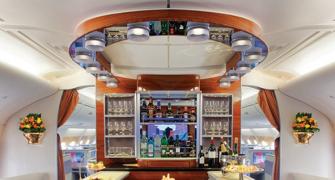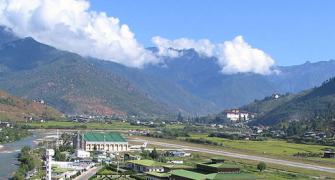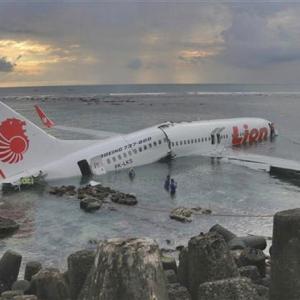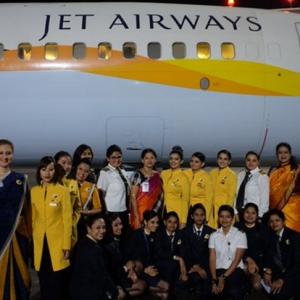Because of this rule, majority of India's international routes have been captured by foreign airlines, says Anjuli Bhargava.
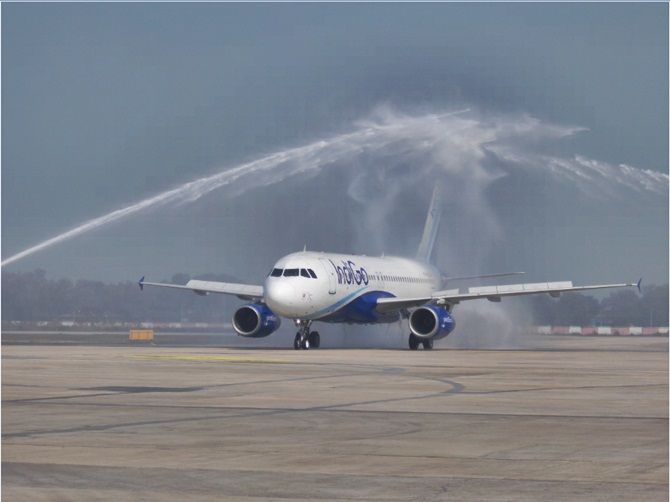 Will the government show the courage and do away with the 5/20 rule, as proposed, in its new aviation policy is one of the biggest questions facing Indian aviation industry.
Will the government show the courage and do away with the 5/20 rule, as proposed, in its new aviation policy is one of the biggest questions facing Indian aviation industry.
The rule was introduced in 2004 to prevent domestic carriers from flying abroad unless they had been in operation for at least five years and had a fleet of minimum 20 aircraft.
According to industry insiders, the rule was brought in at the behest of Naresh Goyal, chairman of Jet airways, one of the oldest private airlines in India.
He had reportedly lobbied for the rule so that his competitors could be prevented from flying abroad.
Now, almost 12 years later, the government is planning to do away with the rule as it has done more harm than good.
Here's why. In 2007-08, despite having been in business in India, airlines like IndiGo, GoAir, SpiceJet and others could not fly abroad because of this rule.
While they were still consolidating their position at home, flying abroad would have helped these airlines, at least by refueling their aircraft outside India when domestic aviation turbine fuel (ATF) prices were prohibitively high. For no-frills airlines, it would have acted as a cushion.
Several industry experts believe this rule was one of the reasons why Kingfisher Airlines stopped flying in 2012.
In 2007, Kingfisher acquired Air Deccan, primarily because the latter had been in business for longer period of time and could get permission to go international.
There was no other reason why the two should have come together - the two airlines had different types of fleet, organisational ethos and culture.
For Vijay Mallya, the permission to fly abroad was a good enough incentive. Even before the merger process was complete, Kingfisher announced its decision to go international.
"I recall how we all celebrated when Mallya announced the decision to go international. We knew it was the beginning of the end," said a former Jet Airways board member on condition of anonymity.
Kingfisher Airlines reverse merged with Air Deccan in 2007.
Even as it grappled with the merger of two totally different entities, KFA went international and burned cash like never before. The rest, as they say, is history.
This was not the only negative fallout of the 5/20 rule. Because of this rule, majority of India's international routes have been captured by foreign airlines.
Some of these foreign airlines are much smaller than Indian airlines which can't fly abroad simply because of this rule.
"It is akin to saying, 'come, make in India but do not export for five years'," says Amber Dubey, partner and India head of aerospace and defence at KPMG India. Dubey says this rule is unique to India.
"In US, EU and Australia, the minimum fleet requirement is one aircraft. It is the financial strength of the applicant that is taken into consideration".
Indian airports have also suffered because of this rule. If this rule had not existed for the past decade or so, some large airports in India could have emerged as regional hubs- like Dubai and Singapore. But the lack of "home carriers" has denied such an opportunity to Indian airports.
Why some airlines have changed position?
Irony is the airlines which had earlier suffered because of the 5/20 rule are the ones lobbying against its removal today.
Experts, however, say there is a presumption that the international market offers "easy money" and hence should be given only to carriers that are at least five years old.
In reality, the international market is extremely competitive where some of the biggest global airlines have suffered failures.
Most global carriers entering a new global route lose money for 18-24 months, before turning profitable.
As per a Parliamentary submission by Ministry of Civil Aviation (MoCA), Air India loses money on most of its global long-haul routes, despite years of route development.
"Global routes are not a low hanging fruit that an airline can just jump and grab" adds Dubey.
Route dispersal guidelines, 5/20 separate issues
In a bid to scuttle the proposal to remove the 5/20 rule, incumbent airlines have linked it with the removal of route dispersal guidelines (RDG).
This, many say, is absurd. One, the RDG was introduced in 1994 while the 5/20 rule came in 2004 and the removal of the two can independent of each other.
Two, RDG has helped in expanding air service to what were earlier remote and less accessible locations.
"RDG has worked well as many of the routes that were initially unviable are now viable and airlines are increasing frequencies as the market has now expanded," says a former aviation secretary.
While airlines may have been unhappy initially, RDG has met the macro objectives that it was meant to serve - expansion of air services to less frequented destinations.
Removal of 5/20 has also been linked to the safety issue - the argument being that an airline needs to prove its safety record domestically before taking to international skies.
"This argument holds little merit - if an airline is safe to fly in India, it is safe enough to fly anywhere in the world," says an industry source.
Experts say, regardless of who gains and who loses, 5/20 should be junked.
"At this rate, no policy can ever be changed because there will always be gainers and losers," says a former civil aviation secretary.
He says, some of the airlines which are now lobbying for 5/20 had lobbied against it during his tenure.
"It's like ragging or dowry practice. You can say others have been ragged or those before us have paid dowry. Does that mean everyone should suffer forever?"
There are no easy answers to these arguments.
All eyes are on the new aviation policy now.
CLIPPED WINGS
The 5/20 rule was introduced in 2004 to prevent domestic carriers from flying abroad unless they had been in operation for at least five years and had a fleet of minimum 20 aircraft.
Several industry experts believe this rule was one of the reasons why Kingfisher Airlines stopped flying in 2012.
If 5/20 rule had not existed for the past decade, some large airports in India could have emerged as regional hubs.


